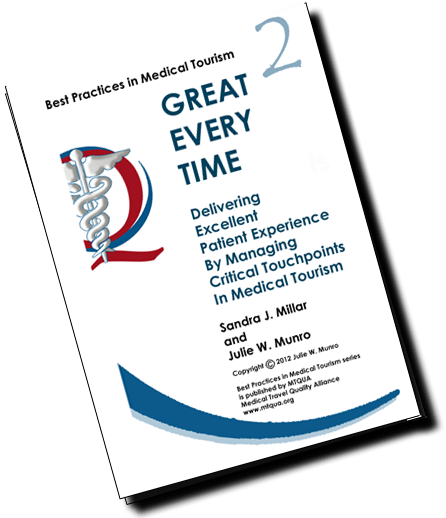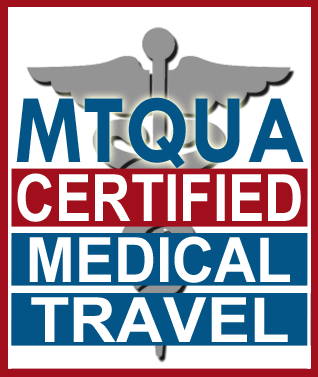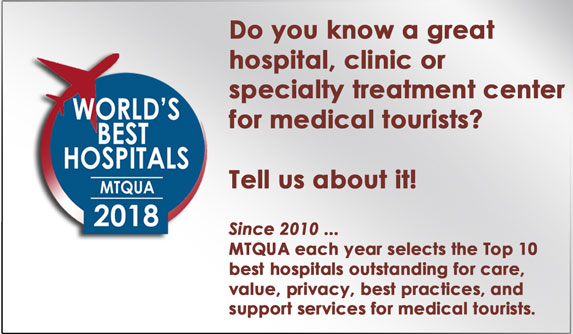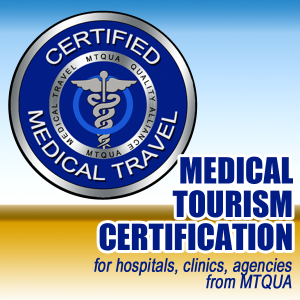Can your medical facility or medical travel company become a quality provider of treatment care for medical tourists?
Many hospitals and clinics will use a smile, “customer service” and good intentions to hide the fact they have poor or no training of service and professional staff about the different care that medical tourists or expat local patients need.
They often turn to “customer service” agents who offer medical tourists a welcoming smile, an airport pick up, an international menu selection in place of services related to treatment quality, patient safety, transparency, cost containment and other unique differences in treating and caring for traveling international patients, or medical tourists.
Medical tourists have different needs than local patients
At the heart of appropriate care for medical travelers is a need for institutional awareness of the unique differences between local patients and medical tourists. Having a better understanding of what medical tourists, their care managers and home-based doctors expect from the receiving hospital or clinic at the medical destination will lead to better quality of patient care for medical travelers.
 Touchpoints – where patients and providers interact – affect both clinical tasks and patient outcomes. Touchpoints determine the total patient experience and level of satisfaction. Read this 25-page report for practical guidelines and useful suggestions in 11 critical areas where patients and providers meet – and sometimes clash. Download GREAT EVERY TIME: Delivering Excellent Patient Experience By Managing Critical Touchpoints In Medical Tourism, a Best Practices in Medical Tourism report from MTQUA.
Touchpoints – where patients and providers interact – affect both clinical tasks and patient outcomes. Touchpoints determine the total patient experience and level of satisfaction. Read this 25-page report for practical guidelines and useful suggestions in 11 critical areas where patients and providers meet – and sometimes clash. Download GREAT EVERY TIME: Delivering Excellent Patient Experience By Managing Critical Touchpoints In Medical Tourism, a Best Practices in Medical Tourism report from MTQUA.
Staff training and coaching about quality of treatment and care in medical tourism
Medical Travel Quality Alliance through its health care and medical tourism partners offers training, coaching, workshops and seminars supporting these aspects of patient care that make up and enhance quality of treatment and care, excellent outcomes, and patient safety in medical tourism.
- Medical quality and outcomes
- International patient management
- International patient marketing
- Patient safety, security and transparency
- The unique needs of the medical traveler
- Hospital leadership and management skills
- Operations and infrastructure
Contact us about your staff training needs.
Communication workshops for medical tourism
The Medical Travel Quality Alliance offers training programs at all levels through its partners to introduce or expand a provider’s knowledge and experience about providing quality treatment and care in medical tourism.
Staff and professionals who have an appreciation of the needs and attitudes of the “international patient” provide better communications, better treatment, and better care for medical tourists. The potential for misunderstandings, readmissions, poor results are significantly reduced with doctors, nurses and support team members gain an appreciation of the care management a foreign patient actually receives in a medical destination with a foreign culture, language and customs.
Staff training includes coaching in cross-selling, aftercare, payment and billing requests, dispute resolution. Discussions with professional staff include professional responsibility within the medical facility, and their scope of professional interaction with the patient.
Contact us about your staff training needs.
Multi-cultural workshops for medical tourism
Multi-cultural staff exposure to foreign patients begins with the initial contact, extends through in-patient and immediate post-surgery events, and should end only after the patients have safely returned and been handed off to the care of their local physicians.
Cultural differences occur at all levels of staff and professional.
- Initial contact
Call center and email correspondence staff, doctors and marketing personnel share in the communication to medical tourists of price quotes, bookings, conversion rates, description of the facility, explanation of services, and description of qualifications of medical personnel.
- Admission
Admissions, customer service and international relations staff, in addition to doctors and nurses, share in dissemination of treatment information, length of stay, payments, insurance liaison, medical reports to home-country physician, cross-cultural patient management, and religious customs.
- Physician communication
Communication skills of the busy physician often remain poorly developed, and the need for established physicians to become better communicators continues. Research has shown that the manner in which a physician communicates information to a patient is as important as the information being communicated.Patients who understand their doctors are more likely to acknowledge health problems, understand their treatment options, modify their behavior accordingly, and follow their medication schedules.
Medical Travel Quality Alliance training staff and partners
Medical Travel Quality Alliance works with health care industry experts and outside specialists to offer training programs, workshops and seminars of value to health care providers. Some of these programs are specific to medical tourism, other programs are health care industry training programs.
Employer and insurer workshops
Some workshops are specially designed to answer the questions and provide the solutions that employers, third party payers, association or pension managers, insurers and hospital executives are looking for when considering health care programs for clients, employees or members that include traveling across national borders to obtain medical treatment abroad.
Contact us about your staff training needs.
Continuing Medical Education credits
Most programs conducted by MTQUA partners qualify for CME credit.
Medical Tourism Certification
 Medical Travel Quality Alliance offers certification in medical tourism for individuals and companies. Certified Medical Concierge, Certified Medical Travel Agent, Certified International Patient Care Manager. Certification in Medical Tourism is now available for providers and related businesses. Read more …
Medical Travel Quality Alliance offers certification in medical tourism for individuals and companies. Certified Medical Concierge, Certified Medical Travel Agent, Certified International Patient Care Manager. Certification in Medical Tourism is now available for providers and related businesses. Read more …



